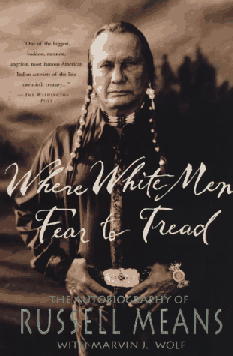 Another Stereotype of the Month entry:
Another Stereotype of the Month entry:
 Another Stereotype of the Month entry:
Another Stereotype of the Month entry:
Fighting "Federal Communism" on the Reservation
By David Yeagley
FrontPageMagazine.com | March 26, 2004
What does a career Indian protester do when he realizes the Left has failed him and his people? Ask Russell Means, Olgala Sioux of Pine Ridge, South Dakota. Mr. Means recently endorsed Republican John Thune's bid for the Senate. Thune is running against Democrat incumbent Tom Daschle. Means now calls himself a "Lakota Libertarian Republican."
It makes perfect sense. There has been little improvement in Indian country under the Democrats. Conditions in South Dakota reservations certainly haven't improved under Daschle. What's an Indian to do politically? "I'm going to work with Sen. Thune's staff," says Means, "and the state Republican Party, and that will open doors to work with the National Republican Party to completely change Indian policy in America."
For some years, in fact, Means has recognized the impotence of the Democratic Party's approach to Indian problems. He joined the Libertarian Party in 1987, and ran as the Libertarian candidate for governor of New Mexico in 2002. "What is an American? I believe an American loves to be free. You are free to be responsible. That's the only rule you should understand," Means says.
That American freedom does not exist on the great Indian reservations. In fact, tyrannical communism reigns on the reservations. Means explains, "This [America] is the only place where communism is successfully practiced in the world. Communism is alive and well on Indian reservations run by the United States government."
The Republican ticket may offer Indians an alternative, says Thune, and he has more than just Russell Means behind him.
Bruce Whalen, also an Oglala Sioux of Pine Ridge, is committee chairman of the Republican Party in Shannon County. Whalen says, "I know there's a lot of Republicans out there on Pine Ridge. They just don't know it yet."
Whalen believes the Republican Party more closely mirrors his traditional Lakota values than the Democratic Party. Those values are respect for life, limited government, sovereignty and local control.
Whalen believes government-funded programs and tribal politics that dole out the money are the root of the reservation's poverty. Alcoholism and other abuses follow suit.
"I see how the social programs are devastating the people around here," he said. "The Democrats are hurting us."
Thune agrees. Indians will identify with Republicans if members of the party take the time to explain what the party stands for. Thune thinks the idea of less government translates into freedom and sovereignty for Indians.
But with the BIA in charge, "it's pure communism," says Russell Means, "and it's an abject failure. Just like it was in the Soviet Union. It's failure. You've created a dictatorship by the Bureau of Indian Affairs."
Means recalls, "The Libertarian Party had a party platform that all claims by Indian people would be settled for existing government surplus land, and that would be the end of it; then they'd be on their own. We'd exist as sovereign nations, as protectorates of the United States government, but economically they'd be on their own. And, I pushed for that. And so all claims, all treaty violations would be taken care of, and there'd be no other recourse except in courts of law. Some would fail, some would succeed."
One Sioux woman, a Sisseton Wahpeton woman of eastern South Dakota, gravely cautions. Betty Ann Gross noted a rift between Indian leaders and Indian people once before, in Sports Illustrated (March 4, 2002). She more recently posted, "I believe it is up to the individual Indian bands in America to make this decision to preserve ‘the Indian' and it is up to each ‘Indian' to assist his own reservation, community, family and self."
In other words, one decision or one solution does not fit all Indian tribes. Each tribe faces different circumstances in terms of size, population, resources, and hence, variant likelihood of success as an independent, sovereign protectorate. And Betty Ann is not so quick to blame the government for all of today's Indian problems. She is a registered Republican also, but does not expect salvation from a political party.
Interestingly, yet another well-known Oglala Indian, Tim Giago, is running on the Democratic ticket against Tom Daschle. Giago, publisher of The Lakota Journal, is definitely a liberal, but also realizes that Democrats and their Indian casinos have done nothing for Indians.
Russell Means says it's all about freedom. Which party promises you the most freedom? Which allows the freedom to be responsible? Given the Democratic record of dealing with Indians in South Dakota, there isn't any doubt in Russell's mind.

Rob's reply
There's nothing more predictable than a Yeagley column. As usual, he has either lied or built his case on false premises. He should forward his columns directly to me for inclusion in the Stereotype of the Month contest so we can all save time.
Yeagley's thesis, that "tyrannical communism reigns on the reservations," shows a couple things. One, that he doesn't have a clue what the definition of communism is. Two, that he's perpetuating the age-old stereotype of Indians as uncivilized savages.
If you don't see the connection, check out the quotes listed in Uncivilized Indians. Conservatives like Yeagley, Rush Limbaugh, and Ronald Reagan clearly think the traditional Native way of life was a failure. Why? Because Indians lived in a "primitive" communal society rather than a modern capitalistic one. They favored liberty, equality, and fraternity over greed, and selfishness.
Yeagley tries to impugn Democratic Indian policy based on Sen. Tom Daschle's record. He apparently doesn't realize Republicans have controlled the White House 16 of the last 24 years. And they've controlled Congress most of the last 10 years. They're the ones whose policies have failed.
Even on the theoretical plane, it's clear Democrats support Indian rights more than Republicans do. Look at the legislative and judicial record on almost any Native issue—religious freedom, for instance. Conservatives are less likely to support Indian sovereignty, gaming, and other important issues at every level—national, state, and local.
Moreover, Yeagley's argument fails for one obvious reason. US senators and representatives don't control a state's fiscal or social policies. The state's governor probably has the most influence, followed by the state legislature and then maybe the US president. The state's Congressional delegation is well down the list.
Not surprisingly, guess who's in charge of South Dakota's government?
Currently:
Governor
Mike Rounds (R)
Lieutenant Governor
Dennis Daugaard (R)
Secretary of State
Chris Nelson (R)
Attorney General
Larry Long (R)
State Auditor
Rich Sattgast (R)
State Treasurer
Vern Larson (R)
State Commissioner of School & Public Lands
Bryce Healy (D)
Official Listing—South Dakota Representatives—2004
Republicans: 49 Democrats: 21
Official Listing—South Dakota Senators—2004
Republicans: 26 Democrats: 9
Nor is this atypical. Here's the lineup back in 2001:
Governor
William J. Janklow (Republican, elected 1994; also served 1979-87)
Legislature
House: 50 Republicans, 20 Democrats
Senate: 24 Republicans, 11 Democrats
With that kind of majority, South Dakota's policies should be decidely pro-Indian. It should be a freedom-loving, small-government paradise. Instead, SD's Indians will tell you theirs is one of the most racist, anti-Indian states in the Union. How is that possible if Yeagley and Means are right?
Yeagley bites the dust
But wait, there's more.
It's easy to ridicule comments like Whalen's, who "believes government-funded programs and tribal politics that dole out the money are the root of the reservation's poverty." When does Whalen (and Yeagley) think these programs and politics began? In 1934, after Congress passed the Indian Reorganization Act? In 1890, after Wounded Knee? After the Indian Wars ended, but before these programs and politics began, do Whalen and Yeagley claim Indians weren't poor? I'd love to hear more about this era of middle- or upper-class Indians, whenever it was.
To further dismantle Yeagley's arguments, examine Russell Means's official platform as he runs for governor of New Mexico. There's not one word about the BIA or Indian reservations. Not one word about policies for "Indians," "Natives," or "indigenous" people. There's no evidence that Means supports ending the federal government's obligations to Indians.
Putting the metaphorical nail in Yeagley's coffin, Tim Giago dropped out of the Senate race and threw his support behind Tom Daschle. Oops. Judging by Giago's comments, he thinks Daschle hasn't done enough but is willing to do more. He certainly prefers the Democrat Daschle to any Republican or Libertarian.
In short, nice try, Yeagley. Better luck reading the political tea leaves next time.
Addendum: Means joins Yeagley in defeat
Russell Means, whom Yeagley pinned his hopes on, utterly failed to convince Indians to vote Republican in the recent election. Oops. The only question left is which of them is more out of touch with reality.
From KOTA Territory News:
Poor Republican showing on reservations upsets Native American activist
6/2/2004 5:40:55 PM
Jack Siebold
After Republican John Thune lost a close senate election to Democrat Tim Johnson two years ago, his party vowed to make a difference where it counted, on reservations.
But another poor Republican showing in reservation counties sparks accusations of idle promises by Russell Means.
A couple of months ago, Means thought he would be working with the Republican Party to help John Thune take down Senator Tom Daschle. "John Thune can win this race and be the giant killer that the Republican Party needs," Means explained.
But he wonders if the Republican Party apparatus is actually up to the task.
In yesterday's special house election, Democrat Stephanie Herseth took 94 percent of Shannon County votes. Todd County wasn't much better for Republican Larry Diedrich, 16 percent of the vote.
Means blames the Republican Party. "The Republican Party is having a hard time, believe it or not; I don't, raising money. So they tell us," he said.
Means thinks the Indian voter is being ignored. "I hadn't heard that, but I certainly don't think that's the case. We made an effort to come down there," Republican House candidate Larry Diedrich said.
The American Indian Movement activist promised the Republicans he could deliver reservation votes come the November election. "When I first approached them with my support, I told them I could guarantee 40 percent of the Indian vote. Okay? Minimum," Means boasted.
Considering Democrats still outnumber Republicans 11-1 in Shannon County, fulfilling that promise may be difficult.
Herseth took 3,635 votes in Shannon and Todd counties. Diedrich garnered only 451, one vote for every eight Herseth received.
Related links
Yeagley the Indian apple
The "outdated" reservation system
|
. . . |

|
All material © copyright its original owners, except where noted.
Original text and pictures © copyright 2007 by Robert Schmidt.
Copyrighted material is posted under the Fair Use provision of the Copyright Act,
which allows copying for nonprofit educational uses including criticism and commentary.
Comments sent to the publisher become the property of Blue Corn Comics
and may be used in other postings without permission.